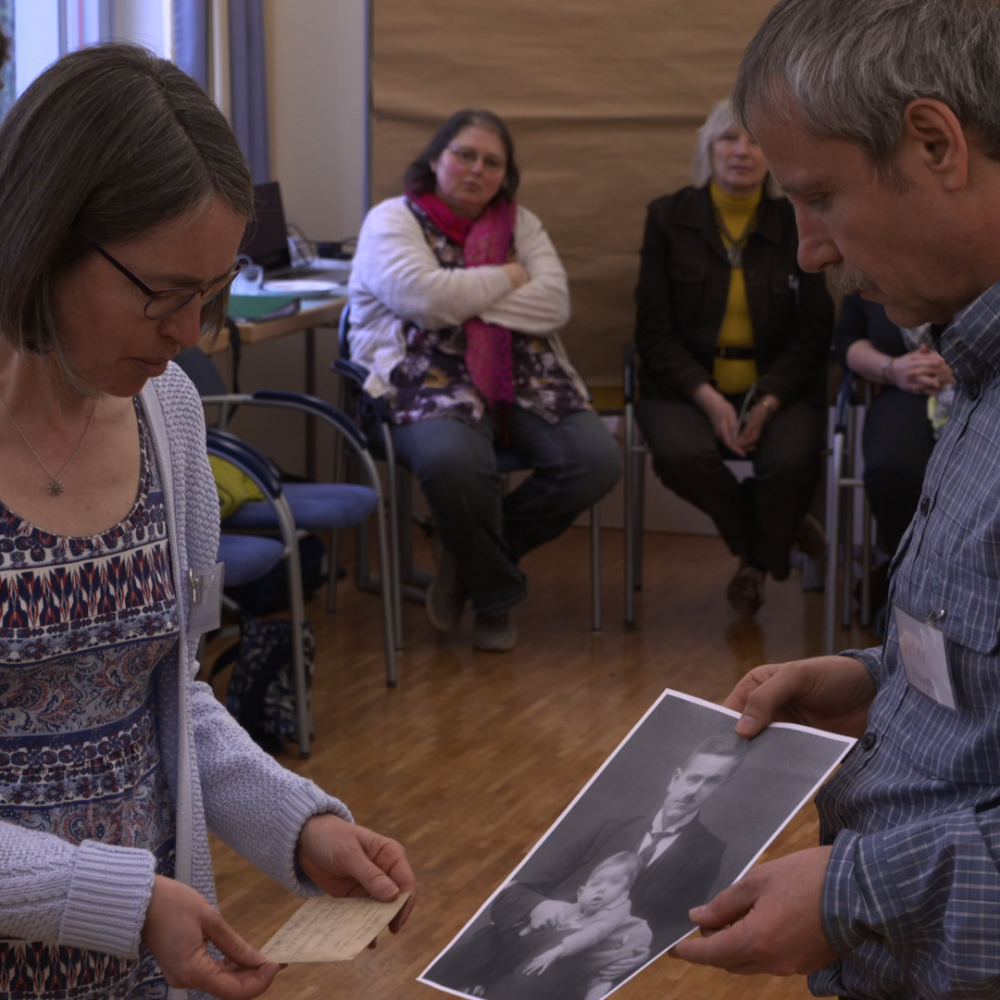Afterlives of the Great War

An an intergenerational study of family legacies of the First World War
Afterlives investigates the family legacies of the First World War in regions with very different histories of conflict in the twentieth century: Britain, Australia, and Germany.
It is an inter-generational study, which seeks to understand how descendants born after 1918 imagined the conflict before their time, and how it shaped their own lives. Funded by the British Academy, the Arts and Humanities Research Council (AHRC), the National Lottery Heritage Fund (NLHF) and the Leverhulme Trust.
Afterlives combines oral history interviews, personal research on Roper’s own family in Australia, and observation of descendants during the First World War Centenary. It is an experiential history, based on the overlapping roles of historian, interviewer, observer, and descendant.
The photo featured is from the NLHF and AHRC funded project Meeting in No Man’s Land, carried out in 2016 by Age Exchange. This project formed the basis of two publications from the project.
The British project
In 2011, Roper began interviews with thirty-six British descendants then in the eighties and nineties. They described what it was like to grow up in the 1920s and 30s when the First World War was in the recent past. Silence was the legacy they noticed most of all as families strove to put the past behind them. Yet children witnessed the impact of trench warfare on bodies and minds, lived amidst the mourning and encountered the material past of war in their daily lives. The legacies could be benign as well as mundane, carried across the generations in the love of travel, ambitions for education, a sense of citizenship and duty, and military aptitudes.
The British research resulted in publications on children of war disabled servicemen, while Dr Rachel Duffett investigated the war’s legacies in children’s play culture. Roper’s interviews formed the basis of the play Voices of the Great War, performed at the Lakeside Theatre in 2016.
The Australian project
Alongside the interviews with British descendants, Roper undertook research with his father in Australia, interviewing him and venturing into the history of his father’s war service at Gallipoli and the Middle East. In doing a family history of the war, he gained a deeper understanding of the motivations of other descendants in Australia as they undertook family histories of the First World War.
The German project
The research extended to Germany after 2015 through Essex’s membership of the NLHF and AHRC First World War Engagement Centre Everyday Lives in War. In 2016 Roper and Rachel Duffett collaborated with David Savill and the reminiscence organisation Age Exchange on the Meeting in No Man’s Land project which brought together 23 British and German descendants in Bavaria for four days of interviews and sharing of family war heritage. This resulted in a digital archive of filmed interviews, commemorative art projects and the Meeting in No Man’s Land Age Exchange film, which premiered at the British Film Institute in summer 2016 and has since been shown in venues across Germany.
Project overview
Our research highlights the differences and similarities in family cultures of First World War remembrance. While Australian descendants commemorate the war as a moment of national making, British descendants remember the ‘pity of war’, and in Germany, family stories of the First World War form a ‘pre-history’ of guilt and responsibility during the Second World War.
The book
The findings of the three projects have been published in a Manchester University Press monograph, Afterlives of the Great War A descendants’ history, available in digital or hardback.
Publications
- Duffett, R., ‘“Playing Soldiers?”: War, Boys, and the British Toy Industry’, in L. Paul, R. R. Johnston and E. Short (eds), Children’s Literature and Culture of the First World War (London: Routledge, 2015), 239–48. ISBN 9780367346201
- Duffett, R., ‘The War in Miniature: Queen Mary’s Dolls’ House and the Legacies of the First World War’, Cultural and Social History, 16: 4 (2019), 431–49.
- Duffett, R. and Roper, M., ‘Making Histories: The Meeting of German and British Descendants of First World War Veterans in “No Man’s Land”, Bavaria, 2016’, The Public Historian, 40: 1 (2018), 13–33.
- Roper, M., 'The Bush, the Suburbs and the Long Great War. A family memoir’, History Workshop Journal, 86 (Autumn 2018), 90-113.
- Roper, M. and Duffett, R., ’Family legacies in the Centenary: motives for First World War commemoration among British and German descendants’, History and Memory, 30 (1), Spring/Summer (2018), 76-115.
- Roper, M., ‘Little Ruby's Hand: Young Women and the Emotional Experience of Caregiving in Britain after the First World War’ in C. Langhamer, L. Noakes and C. Siebrecht (eds.), Total War. An Emotional History. Proceedings of the British Academy 227 (Oxford: Oxford University Press, 2020), 59-77
Researcher



